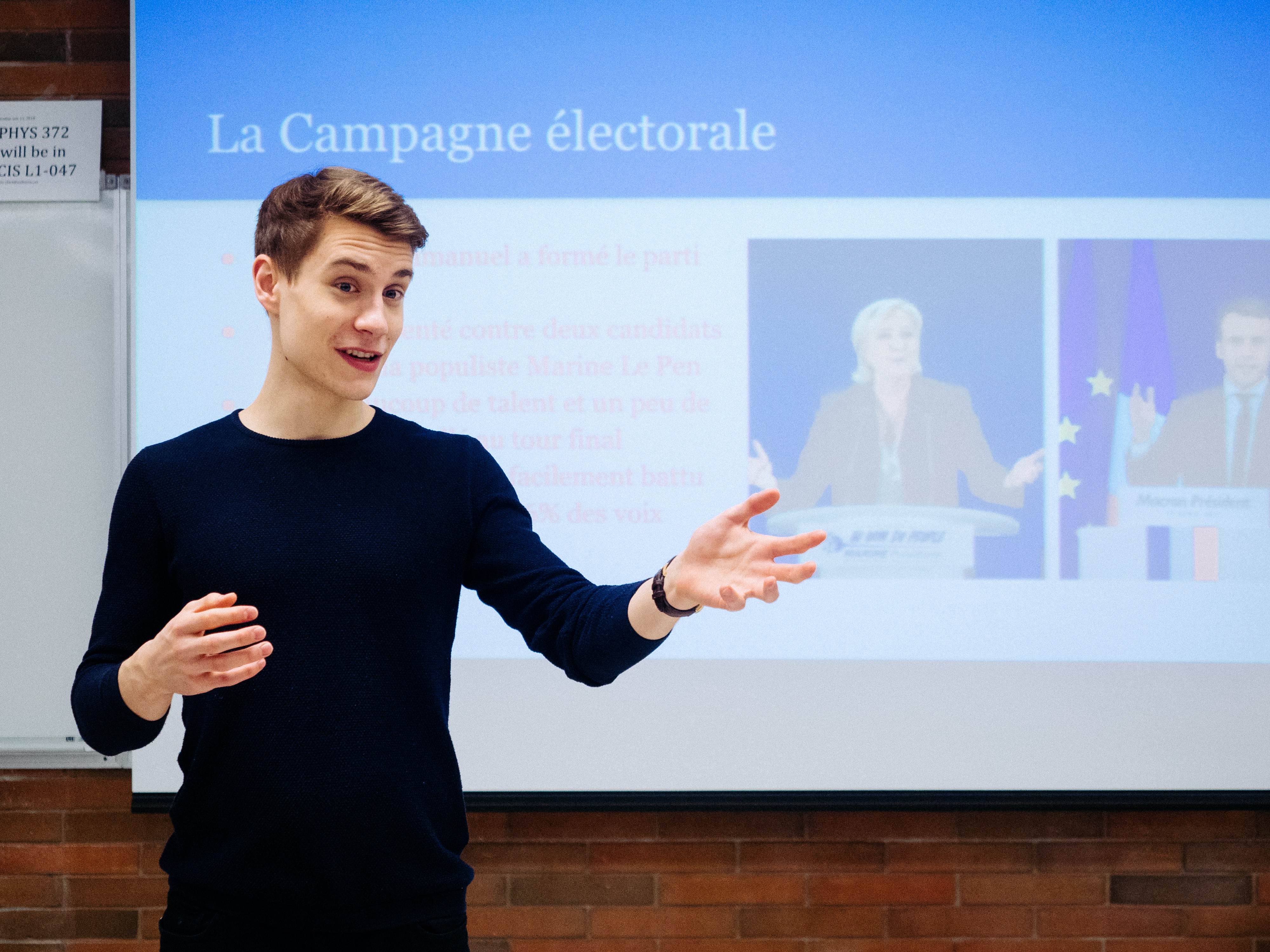
“I don’t think I can do this” my student, Natalia whispers to me less than 5 minutes before her presentation. We’ve just pulled up her powerpoint slides which appear to be excellent, but she is pale and her hands are shaking. Her eyes dart between me and 40 students at various stages of arriving and settling in for today’s class.
Natalia has proven herself to be a capable student who attends regularly and makes thoughtful comments in class. Nor is this presentation a high stakes situation for Natalia; it accounts for 15% of her final grade, and she has told me she is content with her progress (i.e. her grades on assignments) in the course thus far. No. It’s something else.
With a bit of encouragement, Natalia gets through her presentation. While she initially keeps her eyes to the floor (thereby addressing her audience with the top of her head), she does eventually look up and seems to relax a bit. Her classmates are kind and understanding in the face of her fear; they watch her fumble along with rapt attention, no one challenges her, and a few students even cheer at the end. Natalia is all smiles and gives an exaggerated bow to her audience when her presentation is finished. Her presentation lasts 7 minutes. After class she tells me, again in hushed tones and a secretive whisper, “I felt so exposed. So vulnerable. I don’t know how you do this all the time!”
But we do. As Parker Palmer, the author of The Courage to Teach (2017) writes, “Teaching is a daily exercise in vulnerability” (p.17). I remember the first time, 18 years ago, when I stood in front of a room of 100+ students to lead a 3 hour class. I was just like Natalia, yet I did not bow at the end, and the students were not as kind and understanding.
Since that moment, I’ve led countless courses and workshops, guided hundreds of university instructors in effective teaching, and won teaching awards, yet I still feel a flutter of butterflies in my stomach when I teach something new or teach something familiar in a new way. Feelings of vulnerability arise in the small but important moments of teaching, such as when:
- a student asks you a question and you’re not sure of the answer;
- a classroom activity doesn’t work out as well as you’d hoped it would;
- a student challenges your authority or expertise, especially in a large lecture;
- teaching a new course curriculum;
- USRI comments from students are negative, unkind, or inappropriate;
- you share a teaching anecdote or concern with a more experienced colleague;
- you tell students about your own experiences with a concept or as a learner;
- you share your passion and excitement about a research finding or concept
…and many more.
The good news is that by stepping outside your comfort zone in teaching, you create a space for students to step outside of their comfort zones in learning. My colleague Ellen Watson has wisely argued that true teaching may be what happens when you and your students move beyond the prepared slide show or plan for the class:
“In being vulnerable, one is open to judgment, to potential growth, and hopefully, to learning from an experience. Perhaps the vulnerable teacher is open to the student experience when asked an unexpected question. In this reciprocated experience, the teacher may be able to empathize with the struggling or confused student, to rethink their teaching approach of this content, or to find a place of understanding from which to guide learners” (Watson, 2017, p.59).
In other words, teaching and learning is effective when it is an authentic exchange of questions, knowledge, and ideas that improve everyone’s conceptualization of the topic or field. In this process, teachers and learners commonly feel vulnerable or exposed. My purpose here is tell you that you it’s okay to go off the script (of the powerpoint slides or teaching plan), and the vulnerability that accompanies these moments is part of being an educator.
I do have one word of caution. There are boundaries to making ourselves vulnerable in teaching. Over the years, I have also encountered instructors who ‘overshare’. Their students roll their eyes because they do not see how their instructors’ stories or excessive disclosure of their ‘personal stuff’ relates to their own learning or experiences. If your students appear uncomfortable and your anecdote does not lead to sharing or the reciprocal exchanges necessary for learning, it may have been an overshare. The key question to ask yourself is: “How does this anecdote, example, classroom activity, or experience contribute to the students learning?”
Before closing, I wish I could tell you that Natalia went on to become a public speaking champion, but I don’t know. I do know that she made herself vulnerable in her ‘moment of fame’ at the head of the classroom and grew from it… if her smiles and pride (and yes, B grade) are any indication. We often ask our students to do things that make them feel vulnerable, yet at times, shy away from doing things that make us vulnerable. I would urge you to keep moving forward through the vulnerable moments of teaching.
On May 4th, the Festival of Teaching and Learning will welcome Jose Bowen, author of “Teaching Naked”. What does teaching naked mean to him? Sign up for the Festival and find out!Festival of Teaching and Learning will welcome Jose Bowen, author of “Teaching Naked”. What does teaching naked mean to him? Sign up for the Festival and find out!
Cosette Lemelin, MEd., PhD — Educational Developer, Centre for Teaching and Learning

Cosette Lemelin is an Educational Developer for the Centre for Teaching and Learning (CTL) at the University of Alberta where her role is to help university instructors learn how to be better teachers. Cosette is available to assist instructors with course planning, teaching strategies, assessment, and blended or online delivery. This native of Winnipeg has 14 years of teaching experience in a 19 year career in adult education.
References
Palmer, P.J. (2017) The courage to teach: Exploring the inner landscape of the teacher’s life
(20th anniversary edition). San Francisco, CA: Jossey-Bass.
Watson, E. (2017). Unexpected questions: Reflecting on the teacher’s experience of responding
in class. The High school Journal, 101(1) 49–61.